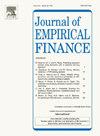Forecasting multivariate volatilities with exogenous predictors: An application to industry diversification strategies
IF 2.4
2区 经济学
Q2 BUSINESS, FINANCE
引用次数: 0
Abstract
We propose a procedure to forecast the realized covariance matrix for a given set of assets within a multivariate heterogeneous autoregressive (MHAR) framework. Utilizing high-frequency data for the U.S. aggregate and industry indexes and a large set of exogenous predictors that include financial, macroeconomic, sentiment, and climate-based factors, we evaluate the out-of-sample performance of industry portfolios constructed from forecasted realized covariance matrices across various univariate and multivariate forecasting models. Our findings show that LASSO-based multivariate HAR models employing predictors that capture climate uncertainty generally yield more consistent evidence regarding the accuracy of the realized covariance forecasts, providing further support for the growing evidence that climate related factors significantly drive return and volatility dynamics in financial markets. While international summits and global warming stand out as the dominant climate predictors for realized volatility forecasts, both climate and macroeconomic predictors prove equally important for longer term correlation forecasts. In these forecasts, the U.S. EPU index and natural disasters, along with U.S. climate policy uncertainty, play dominant predictive roles. Our results suggest that the MHAR framework, coupled with DRD decomposition that splits the covariance matrix into a diagonal matrix of realized variances and realized correlations, can be utilized in a high-frequency setting to implement diversification and smart beta strategies for various investment horizons.
用外生预测因子预测多元波动:在产业多元化策略中的应用
我们提出了一种在多元异构自回归(MHAR)框架中预测一组给定资产的已实现协方差矩阵的过程。利用美国综合指数和行业指数的高频数据以及包括金融、宏观经济、情绪和气候因素在内的大量外生预测因子,我们评估了跨各种单变量和多变量预测模型的预测实现协方差矩阵构建的行业投资组合的样本外表现。我们的研究结果表明,基于lasso的多元HAR模型采用捕捉气候不确定性的预测因子,通常在实现协方差预测的准确性方面产生更一致的证据,为气候相关因素显著驱动金融市场收益和波动动态的证据提供了进一步的支持。虽然国际峰会和全球变暖是实现波动率预测的主要气候预测因子,但气候和宏观经济预测因子对长期相关性预测同样重要。在这些预测中,美国EPU指数和自然灾害以及美国气候政策的不确定性发挥了主要的预测作用。我们的研究结果表明,MHAR框架与DRD分解(将协方差矩阵分解为已实现方差和已实现相关性的对角矩阵)相结合,可以在高频环境中用于实现不同投资范围的多元化和智能贝塔策略。
本文章由计算机程序翻译,如有差异,请以英文原文为准。
求助全文
约1分钟内获得全文
求助全文
来源期刊

Journal of Empirical Finance
Multiple-
CiteScore
3.40
自引率
3.80%
发文量
59
期刊介绍:
The Journal of Empirical Finance is a financial economics journal whose aim is to publish high quality articles in empirical finance. Empirical finance is interpreted broadly to include any type of empirical work in financial economics, financial econometrics, and also theoretical work with clear empirical implications, even when there is no empirical analysis. The Journal welcomes articles in all fields of finance, such as asset pricing, corporate finance, financial econometrics, banking, international finance, microstructure, behavioural finance, etc. The Editorial Team is willing to take risks on innovative research, controversial papers, and unusual approaches. We are also particularly interested in work produced by young scholars. The composition of the editorial board reflects such goals.
 求助内容:
求助内容: 应助结果提醒方式:
应助结果提醒方式:


